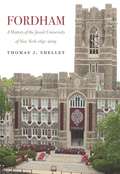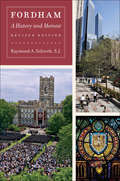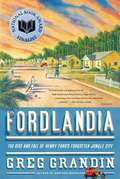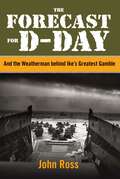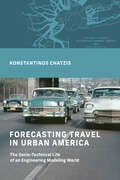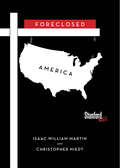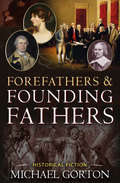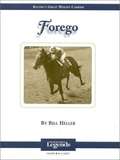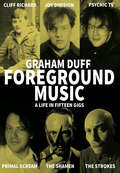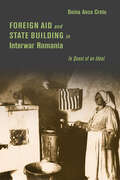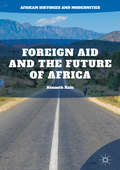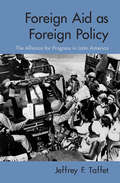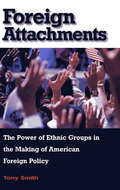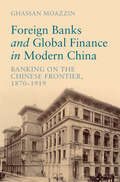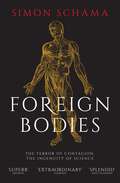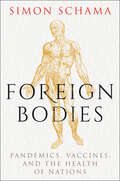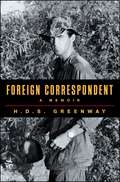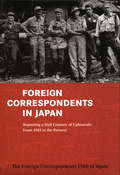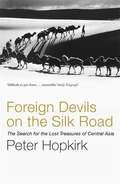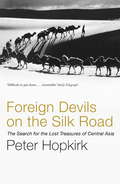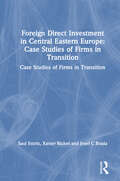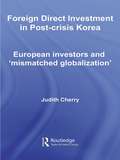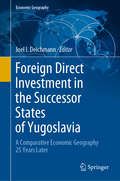- Table View
- List View
Fordham, A History of the Jesuit University of New York: 1841-2003
by Thomas J. ShelleyBased largely on archival sources in the United States and Rome, this book documents the evolution of Fordham from a small diocesan college into a major American Jesuit and Catholic university. It places the development of Fordham within the context of the massive expansion of Catholic higher education that tookplace in the United States in the twentieth century. This was reflected at Fordham in its transformation from a local commuter college to a predominantly residential institution that now attracts students from 48 states and 65 foreign countries to its three undergraduate schools and seven graduate and professional schools with an enrollment of more than 15,000 students.This is honest history that gives due credit to Fordham for its many academic achievements, but it also recognizes that Fordham shared the shortcomings of many Catholic colleges in the United States in the nineteenth and early twentieth centuries. There was an ongoing struggle between Jesuit faculty who wished to adhere closely to the traditional Jesuit ratio studiorum and those who recognized the need for Fordham to modernize its curriculum to meet the demands of the regional accrediting agencies.In recent decades, like virtually all American Catholic universities and colleges, the ownership of Fordham has been transferred from the Society of Jesus to a predominantly lay board of trustees. At the same time, the sharp decline in the number of Jesuit administrators and faculty has intensified the challenge of offeringa first-rate education while maintaining Fordham’s Catholic and Jesuit identity.June 2016 is the 175th anniversary of the founding of Fordham University, and this comprehensive history of a beloved and renowned New York City institution of higher learning will help contribute to celebrating this momentous occasion.
Fordham: A History and Memoir, Revised Edition
by Raymond A. SchrothFordham University is the quintessential American-Catholic institution—and one now looked upon as among the best Catholic universities in the country. Its story is also the story of New York, especially the Bronx, andFordham’s commitment to the city during its rise, fall, and rebirth. It’s a story of Jesuits, soldiers, alumni who fought in World Wars, chaplains, teachers, and administrators who made bold moves and big mistakes, ofpresidents who thought small and those who had vision. And of the first women, students and faculty, who helped bring Fordham into the 20th century. Finally it’s the story of an institution’s attempt to keep its Jesuitand Catholic identity as it strives for leadership in a competitive world. Combining authoritative history and fascinating anecdotes, Schroth offers an engaging account of Fordham’s one hundred thirrty-seven years—here, updated, revised, and expanded to cover the new presidency of Joseph M. McShane, S.J., and the challenges Fordham faces in the new century.
Fordlandia: The Rise and Fall of Henry Ford's Forgotten Jungle City
by Greg GrandinThe stunning, never before told story of the quixotic attempt to recreate small-town America in the heart of the Amazon In 1927, Henry Ford, the richest man in the world, bought a tract of land twice the size of Delaware in the Brazilian Amazon. His intention was to grow rubber, but the project rapidly evolved into a more ambitious bid to export America itself, along with its golf courses, ice-cream shops, bandstands, indoor plumbing, and Model Ts rolling down broad streets. Fordlandia, as the settlement was called, quickly became the site of an epic clash. On one side was the car magnate, lean, austere, the man who reduced industrial production to its simplest motions; on the other, the Amazon, lush, extravagant, the most complex ecological system on the planet. Ford's early success in imposing time clocks and square dances on the jungle soon collapsed, as indigenous workers, rejecting his midwestern Puritanism, turned the place into a ribald tropical boomtown. Fordlandia's eventual demise as a rubber plantation foreshadowed the practices that today are laying waste to the rain forest. More than a parable of one man's arrogant attempt to force his will on the natural world,Fordlandia depicts a desperate quest to salvage the bygone America that the Ford factory system did much to dispatch. As Greg Grandin shows in this gripping and mordantly observed history, Ford's great delusion was not that the Amazon could be tamed but that the forces of capitalism, once released, might yet be contained.
Forecast for D-day: And the Weatherman behind Ike's Greatest Gamble
by John E. RossMonday, June 5, had long been planned for launching D-day, the start of the campaign to liberate Nazi-held Western Europe. Yet the fine weather leading up to the greatest invasion the world would ever see was deteriorating rapidly. Would it hold long enough for the bombers, the massed armada, and the soldiers to secure beachheads in Normandy? That was the question, and it was up to Ike’s chief meteorologist, James Martin Stagg, to give him the answer. On the night of June 4, the weather hung on a knife’s edge. The three weather bureaus advising Stagg—the US Army Air Force, the Royal Navy, and the British Met Office—each provided differing forecasts. Worse, leading meteorologists in the USAAF and Met Office argued stormily. Stagg had only one chance to get it right. Were he wrong, thousands of men would perish, secrecy about when and where the Allies would land would be lost, victory in Europe would be delayed for a year, and the Communists might well take control of the continent.
Forecasting Travel in Urban America: The Socio-Technical Life of an Engineering Modeling World
by Konstantinos ChatzisA history of urban travel demand modeling (UTDM) and its enormous influence on American life from the 1920s to the present.For better and worse, the automobile has been an integral part of the American way of life for decades. Its ascendance would have been far less spectacular, however, had engineers and planners not devised urban travel demand modeling (UTDM). This book tells the story of this irreplaceable engineering tool that has helped cities accommodate continuous rise in traffic from the 1950s on. Beginning with UTDM&’s origins as a method to help plan new infrastructure, Konstantinos Chatzis follows its trajectory through new generations of models that helped make optimal use of existing capacity and examines related policy instruments, including the recent use of intelligent transportation systems.Chatzis investigates these models as evolving entities involving humans and nonhumans that were shaped through a specific production process. In surveying the various generations of UTDM, he delves into various means of production (from tabulating machines to software packages) and travel survey methods (from personal interviews to GPS tracking devices and smartphones) used to obtain critical information. He also looks at the individuals who have collectively built a distinct UTDM social world by displaying specialized knowledge, developing specific skills, and performing various tasks and functions, and by communicating, interacting, and even competing with one another.Original and refreshingly accessible, Forecasting Travel in Urban America offers the first detailed history behind the thinkers and processes that impact the lives of millions of city dwellers every day.
Foreclosed America
by Isaac William Martin Christopher NiedtFrom 2007 to 2012, almost five percent of American adults-about ten million people-lost their homes because they could not make mortgage payments. The scale of this home mortgage crisis is unprecedented-and it's not over. Foreclosures still displace more American homeowners every year than at any time before the twenty-first century. The dispossession and forced displacement of American families affects their health, educational success, and access to jobs. It continues to block any real recovery in the hardest-hit communities. While we now know a lot about how this crisis affected the global economy, we still know very little about how it affected the people who lost their homes. Foreclosed America offers the first representative portrait of those people-who they are, how and where they live after losing their homes, and what they have to say about their finances, their neighborhoods, and American politics. It is a sobering picture of Americans down on their luck, and of a crisis that is testing American democracy.
Forefathers & Founding Fathers
by Michael GortonA novel based on the forgotten historical figures who ensured the triumph of democracy in the country that would become America. A Global eBook Awards Gold Medal Winner In the early colonies, this country was on the precipice of becoming an autocratic theocracy. A century and a half before Jefferson and Adams, the battle for democracy, freedom, and equal rights was sparked by a few people who are now lost and forgotten pieces of history. Travel back to 1620s London, where hardworking and creative Samuel met Mary, a unique and highly educated woman. Their journey would lead them to the colonies, where they were ostracized and sentenced to death for introducing the fundamental principles modern Americans hold dear. This fast-paced historical fiction will make you question your understanding of the founding years of this free nation. These pioneers created the template our founding fathers used to build America. Forefathers & Founding Fathers is an adventure, a love story, and a tale of great persistence—a tale that every American should know and yet most do not. This expanded second edition explores even further into the lives of these impactful figures, giving a deeper perspective on their sacrifices and devotion to this country.
Forego (Thoroughbred Legends #6)
by Bill HellerForego tells the story of the great gelding whose grit and determination on the racetrack captured the hearts of racing fans across the country. Forego raced from the age of three through age eight, winning 34 of his 57 career starts. He earned a record eight Eclipse Awards, the highest honor in horse racing, including three Horse of the Year titles from 1974 to 1976. During his Horse of the Year seasons, Forego became renowned for carrying heavy weights in races, carrying 130 pounds or more in 24 stakes or top-class races. He was elected to the Racing Hall of Fame in 1979. Forego follows the gelding from his beginnings, through his early years on the track, including his effort in Secretariat's Kentucky Derby, and on to stardom. The book looks at Forego's retirement from racing and his life at the Kentucky Horse Park in Lexington, Kentucky, where fans could visit him until his death in 1997. Author Bill Heller also weaves in the stories of Forego's owner, Martha Gerry, and his primary trainers Sherrill Ward and Frank Y. Whiteley, both of whom were inducted into the Racing Hall of Fame.
Foreground Music: A Life in Fifteen Gigs (Strange Attractor Press Ser.)
by Graham DuffA chronicle of a lifetime's passion for gig-going, by one of British television's most respected writers.“Foreground Music is an absolute gem. Charming, very funny and often achingly melancholy, Graham Duff's memoir is suffused with a genuine passion for live music and its (occasionally eccentric) power.—Mark GatissThe result of a lifetime's passion for gig-going by one of British television's most respected writers, Foreground Music is at once enthusiastically detailed and tremendously illuminating—of both the concert moment and its place in popular culture. It is an engaging memoir of a life lived to the fullest, and a vivid, insightful, and humorous exploration of what music writing might be.Foreground Music describes music performances that range from a Cliff Richard gospel concert, attended by Duff at the age of ten, to the fourteen-year-old Duff's first rock show, where the Jam played so loudly he blacks out, to a Joy Division gig that erupted into a full-scale riot. Duff goes on pub crawls with Mark E. Smith of the Fall, convinces Paul Weller to undertake his first acting role, and attempts to interview Genesis P. Orridge of Throbbing Gristle while tripping on LSD.Foreground Music captures the energy and power of life-changing gigs, while tracing the evolution of forty years of musical movements and subcultures. But more than that, it's an honest, touching, and very funny story of friendship, love, creativity, and mortality, and a testimony to music's ability to inspire and heal. Illustrated with photographs and ephemera from the author's private collection.
Foreign Aid and State Building in Interwar Romania: In Quest of an Ideal (Stanford Studies on Central and Eastern Europe)
by Doina Anca CretuThe decades following World War I were a period of political, social, and economic transformation for Central and Eastern Europe. This book considers the role of foreign aid in Romania between 1918 and 1940, offering a new history of the interrelation between state building and nongovernmental humanitarianism and philanthropy in the interwar period. Doina Anca Cretu argues that Romania was a laboratory for transnational intervention, as various state builders actively pursued, accessed, and often instrumentalized American assistance in order to accelerate reconstructive and modernizing projects after World War I. At its core, this is a study of how local views, ambitions, and practical agendas framed trajectories of humanitarian and philanthropic endeavors in postimperial Central and Eastern Europe. Conversely, it is a reflection on the ways that architects and practitioners of foreign aid sought to transfer notions of democracy, civilization, and modernity within shifting local and national contexts in the aftermath of the war and after the collapse of European empires. At the intersection of the history of interwar Europe and international philanthropy and humanitarianism, this book's innovative and explicitly transnational approach provides a new framework for understanding the contours of European nationalism in the twentieth century.
Foreign Aid and the Future of Africa (African Histories And Modernities)
by Kenneth KaluDuring the past five decades, sub-Saharan Africa has received more foreign aid than has any other region of the world, and yet poverty remains endemic throughout the region. As Kenneth Kalu argues, this does not mean that foreign aid has failed; rather, it means that foreign aid in its current form does not have the capacity to procure development or eradicate poverty. This is because since colonialism, the average African state has remained an instrument of exploitation, and economic and political institutions continue to block a majority of citizens from meaningful participation in the economy. Drawing upon case studies of Angola, Cameroon, Chad, Equatorial Guinea, Democratic Republic of the Congo, and Nigeria, this book makes the case for redesigning development assistance in order to strike at the root of poverty and transform the African state and its institutions into agents of development.
Foreign Aid as Foreign Policy: The Alliance for Progress in Latin America
by Jeffrey TaffetForeign Aid as Foreign Policy presents a wide-ranging, thoughtful analysis of the most significant economic-aid program of the 1960s, John F. Kennedy’s Alliance for Progress. Introduced in 1961, the program was a ten-year, multi-billion-dollar foreign-aid commitment to Latin American nations, meant to help promote economic growth and political reform, with the long-term goal of countering Communism in the region. Considering the Alliance for Progress in Chile, Brazil, the Dominican Republic, and Colombia, Jeffrey F. Taffet deftly examines the program’s successes and failures, providing an in-depth discussion of economic aid and foreign policy, showing how policies set in the 1960s are still affecting how the U.S. conducts foreign policy today. This study adds an important chapter to the history of US-Latin American Relations.
Foreign Attachments: The Power of Ethnic Groups in the Making of American Foreign Policy
by Tony SmithWho speaks for America in world affairs? In this insightful new book, Tony Smith finds that, often, the answer is interest groups, including ethnic ones. This seems natural in a country defined by ethnic and cultural diversity and a democratic political system. And yet, should not the nation's foreign policy be based on more general interests? On American national interests? In exploring this question, Smith ranges over the history of ethnic group involvement in foreign affairs; he notes the openness of our political system to interest groups; and he investigates the relationship between multiculturalism and U.S. foreign policy. The book has three major propositions. First, ethnic groups play a larger role in the formulation of American foreign policy than is widely recognized. Second, the negative consequences of ethnic group involvement today outweigh the benefits this activism at times confers on America in world affairs. And third, the tensions of a pluralist democracy are particularly apparent in the making of foreign policy, where the self-interested demands of a host of domestic actors raise an enduring problem of democratic citizenship--the need to reconcile general and particular interests.
Foreign Banks and Global Finance in Modern China: Banking on the Chinese Frontier, 1870-1919 (Cambridge Studies in the Emergence of Global Enterprise)
by Ghassan MoazzinIn this wide-ranging study, Ghassan Moazzin sheds critical new light on the history of foreign banks in late 19th and early 20th century China, a time period that saw a substantial influx of foreign financial institutions into China and a rapid increase of both China's foreign trade and its interactions with international capital markets. Drawing on a broad range of German, English, Japanese and Chinese primary sources, including business records, government documents and personal papers, Moazzin reconstructs how during this period foreign banks facilitated China's financial integration into the first global economy and provided the financial infrastructure required for modern economic globalization in China. Foreign Banks and Global Finance in Modern China shows the key role international finance and foreign banks and capital markets played at important turning points in modern Chinese history.
Foreign Bodies (British Library Crime Classics #0)
by Martin EdwardsEDITED AND INTRODUCED BY MARTIN EDWARDS Today, translated crime fiction is in vogue – but this was not always the case. A century before Scandi noir, writers across Europe and beyond were publishing detective stories of high quality. Often these did not appear in English and they have been known only by a small number of experts. This is the first ever collection of classic crime in translation from the golden age of the genre in the 20th century. Many of these stories are exceptionally rare, and several have been translated for the first time to appear in this volume.
Foreign Bodies: Pandemics, Vaccines and the Health of Nations
by Simon SchamaCities and countries engulfed by panic and death, desperate for vaccines but fearful of what inoculation may bring. This is what the world has just gone through with Covid-19. But as Simon Schama shows in his epic history of vulnerable humanity caught between the terror of contagion and the ingenuity of science, it has happened before. Characteristically, with Schama the message is delivered through gripping, page-turning stories set in the eighteenth and nineteenth centuries: smallpox strikes London; cholera hits Paris; plague comes to India. Threading through the scenes of terror, suffering and hope – in hospitals and prisons, palaces and slums – are an unforgettable cast of characters: a philosopher-playwright burning up with smallpox in a country chateau; a vaccinating doctor paying house calls in Halifax; a woman doctor in south India driving her inoculator-carriage through the stricken streets as dead monkeys drop from the trees. But we are also in the labs when great, life-saving breakthroughs happen, in Paris, Hong Kong and Mumbai. At the heart of it all, an unsung hero: Waldemar Haffkine. A gun-toting Jewish student in Odesa turned microbiologist at the Pasteur Institute, hailed in England as &‘the saviour of mankind&’ for vaccinating millions against cholera and bubonic plague in British India while being cold-shouldered by the medical establishment of the Raj. Creator of the world&’s first mass production line of vaccines in Mumbai he is tragically brought down in an act of shocking injustice. Foreign Bodies crosses borders between east and west, Asia and Europe, the worlds of rich and poor, politics and science. Its thrilling story carries with it the credo of its author on the interconnectedness of humanity and nature; of the powerful and the people. Ultimately, Schama says, as we face the challenges of our times together, &‘there are no foreigners, only familiars&’.
Foreign Bodies: Pandemics, Vaccines, and the Health of Nations
by Simon SchamaA vibrant cultural history investigating the tangled and complex history of pandemics and vaccines, by bestselling author and historian Simon SchamaCities and countries engulfed by panic and death, desperate for vaccines but fearful of what inoculation may bring. This is what the world has just gone through with Covid-19. But as Simon Schama shows in his epic history of vulnerable humanity caught between the terror of contagion and the ingenuity of science, it has happened before. Characteristically, Schama’s message is delivered through gripping, page-turning stories set in the eighteenth and nineteenth centuries: smallpox strikes London; cholera hits Paris; plague comes to India. Threading through the scenes of terror, suffering and hope – in hospitals and prisons, palaces, and slums – are an unforgettable cast of characters: a philosopher-playwright burning up with smallpox in a country chateau; a vaccinating doctor paying house calls in Halifax; a woman doctor in south India driving her inoculator-carriage through the stricken streets as dead monkeys drop from the trees. But we are also in the labs when great, life-saving breakthroughs happen, in Paris, Hong Kong, and Mumbai. At the heart of it all is an unsung hero: Waldemar Haffkine, a gun-toting Jewish student in Odesa turned microbiologist at the Pasteur Institute, hailed in England as “the saviour of mankind” for vaccinating millions against cholera and bubonic plague in British India while being cold-shouldered by the medical establishment of the Raj. Creator of the world’s first mass production line of vaccines in Mumbai, he is tragically brought down in an act of shocking injustice. Foreign Bodies crosses borders between east and west, Asia and Europe, the worlds of rich and poor, politics and science. Its thrilling story carries with it the credo of its author on the interconnectedness of humanity and nature; of the powerful and the people. Ultimately, Schama says, as we face the challenges of our times together, “there are no foreigners, only familiars.”
Foreign Correspondent
by H.D.S. GreenwayDavid Greenway, a journalist's journalist in the tradition of Michael Herr, David Halberstam, and Dexter Filkins. In this vivid memoir, he tells us what it's like to report a war up close.Reporter David Greenway was at the White House the day Kennedy was assassinated. He was in the jungles of Vietnam in that war's most dangerous days, and left Saigon by helicopter from the American embassy as the city was falling. He was with Sean Flynn when Flynn decided to get an entire New Guinea village high on hash, and with him hours before he disappeared in Cambodia. He escorted John le Carre around South East Asia as he researched The Honourable Schoolboy. He was wounded in Vietnam and awarded a Bronze Star for rescuing a Marine. He was with Sidney Schanberg and Dith Pran in Phnom Penh before the city descended into the killing fields of the Khmer Rouge. Greenway covered Sadat in Jerusalem, civil war and bombing in Lebanon, ethnic cleansing and genocide the Balkans, the Gulf Wars (both), and reported from Afghanistan and Iraq as they collapsed into civil war. This is a great adventure story--the life of a war correspondent on the front lines for five decades, eye-witness to come of the most violent and heroic scenes in recent history.
Foreign Correspondents in Japan
by Charles PomeroySince its founding in 1945, the Foreign Correspondents Club of Japan (FCCJ) has been a haven for working journalists. From its origins at "No. 1 Shimbun Alley" in the ruins of Tokyo immediately after World War II, the club quickly took on a life of its own. At times it became like a miniature United Nations, meeting the needs of hundreds of foreign journalists from around the world, who used it as a working press center as well as a social oasis.Club members, who include several Pulitzer Prize winners, have personally witnessed and reported on some of the most momentous events of the last half century-the end of World War II and the occupation of Japan; the revolution in China; the Korean War; Vietnam and the student riots of the 1960s; the height of the Cold War; Japan's economic miracle and the subsequent collapse of the "bubble" economy; the death of Emperor Hirohito; and much more.Foreign Correspondents in Japan gives an intimate and colorful look at these journalists who covered Asia for the rest of the world during five decades of sweeping change, and provides first-person accounts of history as it was being written.
Foreign Devils on the Silk Road: The Search for the Lost Treasures of Central Asia
by Peter HopkirkThe story of the intrepid men who, at great personal risk, led the long-range archaeological raids on the Silk Road, incurring the undying wrath of the Chinese The Silk Road, which linked imperial Rome and distant China, was once the greatest thoroughfare on earth. Along it traveled precious cargoes of silk, gold, and ivory, as well as revolutionary new ideas. Its oasis towns blossomed into thriving centers of Buddhist art and learning. In time it began to decline. The traffic slowed, the merchants left, and finally its towns vanished beneath the desert sands to be forgotten for a thousand years. But legends grew of lost cities filled with treasures and guarded by demons. In the early years of the last century foreign explorers began to investigate these legends, and very soon an international race began for the art treasures of the Silk Road. Huge wall paintings, sculptures, and priceless manuscripts were carried away by the ton and are today scattered through the museums of a dozen countries.
Foreign Devils on the Silk Road: The Search for the Lost Treasures of Central Asia
by Peter HopkirkThe Silk Road, which linked imperial Rome and distant China, was once the greatest thoroughfare on earth. Along it travelled precious cargoes of silk, gold and ivory, as well as revolutionary new ideas. Its oasis towns blossomed into thriving centres of Buddhist art and learning. In time it began to decline. The traffic slowed, the merchants left and finally its towns vanished beneath the desert sands to be forgotten for a thousand years. But legends grew up of lost cities filled with treasures and guarded by demons. In the early years of the last century foreign explorers began to investigate these legends, and very soon an international race began for the art treasures of the Silk Road. Huge wall paintings, sculptures and priceless manuscripts were carried away, literally by the ton, and are today scattered through the museums of a dozen countries. Peter Hopkirk tells the story of the intrepid men who, at great personal risk, led these long-range archaeological raids, incurring the undying wrath of the Chinese.
Foreign Devils on the Silk Road: The Search for the Lost Treasures of Central Asia
by Peter HopkirkThe Silk Road, which linked imperial Rome and distant China, was once the greatest thoroughfare on earth. Along it travelled precious cargoes of silk, gold and ivory, as well as revolutionary new ideas. Its oasis towns blossomed into thriving centres of Buddhist art and learning. In time it began to decline. The traffic slowed, the merchants left and finally its towns vanished beneath the desert sands to be forgotten for a thousand years. But legends grew up of lost cities filled with treasures and guarded by demons. In the early years of the last century foreign explorers began to investigate these legends, and very soon an international race began for the art treasures of the Silk Road. Huge wall paintings, sculptures and priceless manuscripts were carried away, literally by the ton, and are today scattered through the museums of a dozen countries. Peter Hopkirk tells the story of the intrepid men who, at great personal risk, led these long-range archaeological raids, incurring the undying wrath of the Chinese.
Foreign Direct Investment in Central Eastern Europe: Case Studies of Firms in Transition
by Xavier Richet Saul Estrin Josef C BradaThis work presents twelve case studies of foreign direct investment in Bulgaria, the Czech Republic, and Slovenia. The studies include major firms such as Skoda and Danone, as well as smaller ventures, and cover the same sectors for each country, thereby permitting useful comparisons and assessments of: the role of country, sector, technology, and firm-specific characteristics in determining the pattern and nature of foreign direct investment; the potential implications of FDI for the competitiveness of the investing firms; the impact of infusions of capital investments, technology, and managerial resources for the host economies; and the policy implications for host countries and relevant international institutions.
Foreign Direct Investment in Post-Crisis Korea: European Investors and 'Mismatched Globalization' (Routledge Advances in Korean Studies)
by Judith CherryIn this book Judith Cherry analyses the impact of economic and cultural globalization on efforts to promote inward foreign direct investment (IFDI) in South Korea over the past four decades. The book traces the development of Korean IFDI policy from one of restriction and control to one of encouragement and promotion. Specifically, it focuses on the challenges inherent in reforming the ‘software’ of IFDI promotion (socio-cultural issues, mindsets and perceptions) as opposed to changing its ‘hardware’ (systems, laws and regulations). Although the Korean government has made sustained efforts over the past decade to enhance Korea’s attractions as a host for inward investment, it has faced significant challenges in improving Korea’s IFDI performance. The discussion in this book of the wide range of transparent and non-transparent barriers that continue to hamper efforts to promote inward investment draws not only on the Korean debate concerning strategies for maximizing the benefits of IFDI, but also on the assessment of the Korean business and investment environment revealed in interviews conducted with European investors and officials in Seoul. Foreign Direct Investment in Post-Crisis Korea will appeal to students and scholars of international business, economics and globalization, as well as those with a more general interest in Korean society.
Foreign Direct Investment in the Successor States of Yugoslavia: A Comparative Economic Geography 25 Years Later (Economic Geography)
by Joel I. DeichmannThis edited volume offers a descriptive analysis of foreign direct investment (FDI) flows and cumulative stock, industrial composition, and important spatial trends for each successor state of former Yugoslavia: Bosnia & Herzegovina, Croatia, Kosovo, Montenegro, North Macedonia, Serbia, and Slovenia. The chapters are written by academic experts on the topic from each of these countries and are organised systematically in order to facilitate comparison between the states. The aim of this book is to advance scholarly knowledge about FDI in Southeastern Europe 25 years after the dissolution of Yugoslavia. Each chapter includes a summary of scholarly contributions published on the topic in English-language and local language journals, a discussion of origins, composition by industry, and location choice within the country from 1995-2018, using Dunning's (1980) eclectic paradigm as a discussion framework. The chapters conclude with prospects for FDI over the next twenty-five years with emphasis on economic growth projections, EU integration, and other relevant country-specific considerations the local authors deem relevant. Special attention is given to specific companies operating in Yugoslavia prior to its breakup and how these firms have been impacted by dissolution, recession, efforts toward European Union membership. The authors also examine the past and potential impact of FDI from unforeseen events such as the Global Financial Crisis and COVID-19. This book appeals to scholars of geography, international business, economics, and economic history of the former Yugoslavia as well as professionals working in the region and on related topics elsewhere.
